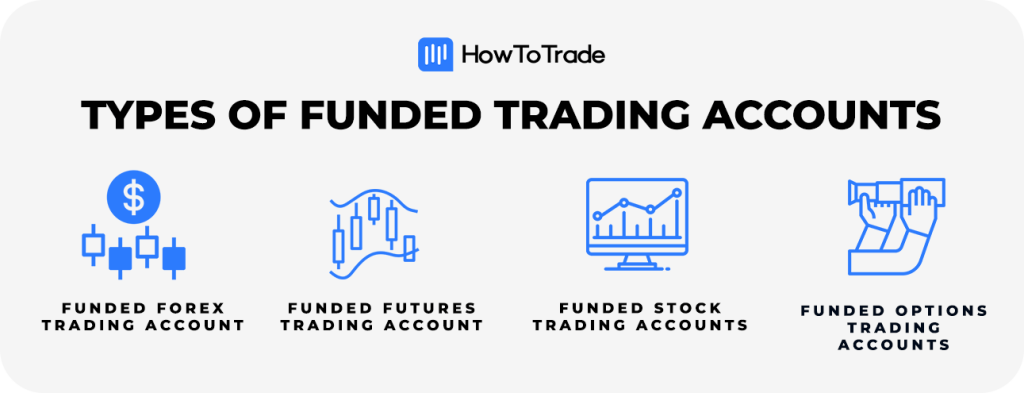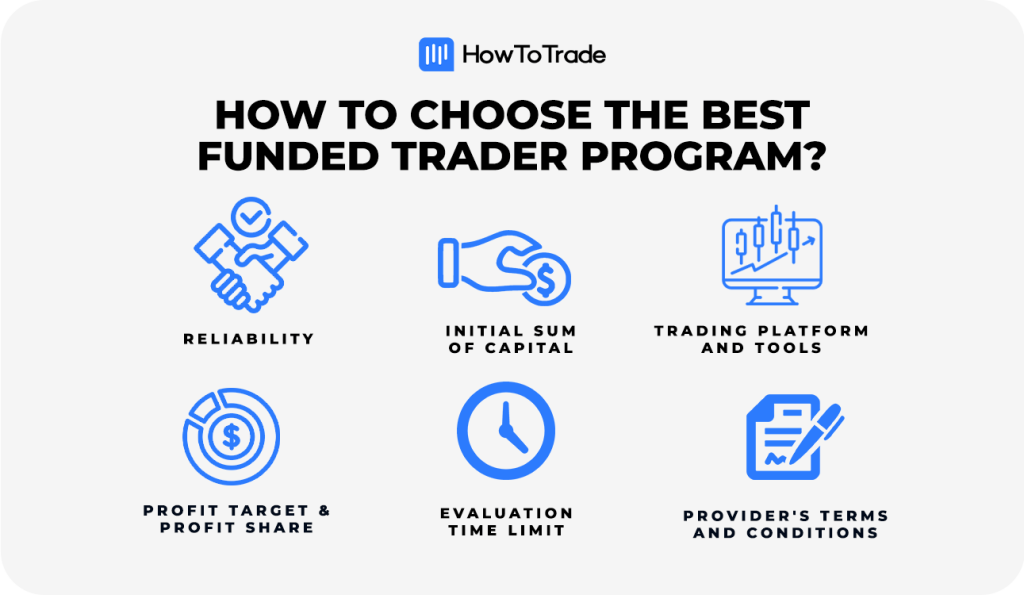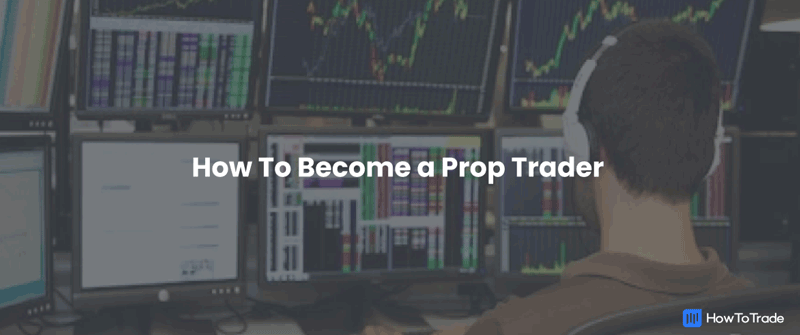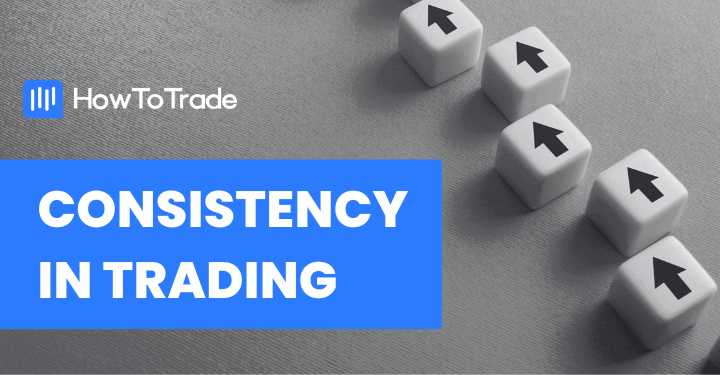
- A funded trading account is an account that is traded on behalf of a company by a third-party trader.
- Different types of funded trading accounts include forex, futures, stock, and options funded trading accounts.
- Several factors to consider when selecting a funded trader program include reliability, the initial sum of capital, trading platforms and tools, profit target & profit share, evaluation time limit, and provider’s terms and conditions.
If you’re a prop trader, earning a funded account is your ultimate goal. But what exactly is a funded account? In this article, we’ll explain the ins and outs of funded trader programs and how they can help you reach your financial goals.
By the time you’re reading our conclusion, you’ll have learned:
- How funded trading accounts work
- The various types of funded trading accounts
- The benefits and limitations of a funded trading account, and
- How to confidently choose a funded trading program for yourself.
 Table of Contents
Table of Contents
- What is a Funded Trading Account?
- Types of Funded Trading Accounts
- How Do Funded Trading Accounts Work?
- How to Choose the Best Funded Trader Program?
- Pros and Cons of a Funded Account
- Why Choose HowToTrade’s Academy to Career Trader Program?
- How Do I Get Funded as a Trader?
- What is a Funded Trader Program?
- What’s the Risk of Using a Funded Trading Account?
- How Much Can You Make as a Funded Trader?
- How Do Proprietary Trading Firms Make Money?
- Do Prop Firms Give You Real Money to Trade?
- Conclusion
What is a Funded Trading Account?
A funded trading account is an account that is traded on behalf of a company by a third-party trader. Funded accounts furnish talented individuals with sufficient risk capital, leverage, and purchasing power. Armed with this equity, astute traders can generate profits by engaging the world’s financial markets.
Many professional traders rely on funded accounts to make a living in the markets. Whether as a primary or secondary source of equity, a funded trading account is an invaluable asset for any serious trader.
A proprietary trading firm (prop firm) is a company for which third-party traders trade.
Funded accounts furnish talented individuals with sufficient risk capital, leverage, and purchasing power. Armed with this equity, astute traders can generate profits by engaging the world’s financial markets.
How Do Funded Trading Accounts Work?
Funded trading accounts have several trading tests that must be completed before they become active. In practice, these tests will vary from one prop firm to another. However, regardless of the firm, the process is fairly straightforward. All you need to do is successfully pass an evaluation period, receive access to a funded trading account, and then begin trading.
The first step in becoming a funded trader is to buy and pass an evaluation phase. Commonly called a “challenge,” this is your way of proving that you’re capable of being profitable. Working within a set of risk management parameters, applicants must achieve a defined level of profitability within a certain period. For instance, a prop firm may require the trader to make 10% profits while not taking a 5% drawdown within a single trading day and 10% over 60 days. More prop firms have recently been rolling out an unlimited time limit to pass challenges. Upon completing the challenge, the trader gets awarded a funded account.
Once awarded a funded account, live trading may begin. The trader engages in the markets while adhering to the same risk management parameters outlined in the challenge. If profitable, realized gains are split with the prop firm. Funded trader account profit splits vary from firm to firm. They may range from a standard 50/50 to a 70/30 split to the trader.
Prop firms often ask you to pass two evaluation/challenge stages, each with a profit target. Any profit you make on these evaluation stages are not withdrawable. But if you pass these challenges, they offer you funded accounts to trade, where you can be paid a share of whatever profit you make.
These funded accounts aren’t real trading accouts with real money, though. They’re simply simulated accounts, but the firm pays you your proifit share when you’re profitable and you lose your investment capital and your funded trading account if your loses reach a certain threshold.
Funded Trading Accounts Types – What Markets and Assets Can You Trade as a Funded Trader?
One of the best things about funded accounts is flexibility. When you’re funded, you have the trading capital to trade nearly anything. Best of all, you can attack multiple tradable assets simultaneously.
Funded traders are free to engage in the most popular financial instruments. Anyone with a funded trading account can target the forex, futures, shares, and options markets.
1. Funded Forex Trading Account
A funded forex trading account allows the holder to trade the globe’s largest market — the forex. Boasting an average daily turnover of upwards of US$5 trillion, the foreign exchange market (forex) is an ideal destination for many a funded trader account.
The forex market gives currency specialists a chance to apply their trading skills. Best of all, funded individuals can access the leverage and purchasing power they need to make a living from actual trading.
Gone are the days of managing micro-lot positions. With forex-funded accounts, you can trade standard lots and let profits run!
2. Funded Futures Trading Account
A futures contract is a legally binding agreement that defines the exchange of a specific asset quantity at a future time. Futures contracts are traded with high degrees of leverage and offer the opportunity to realize extraordinary gains.
A funded futures account allows the trader to access vital markets such as the Chicago Mercantile Exchange (CME) and Euronext. Asset classes such as equities, energies, bonds, and metals are available.
Futures products have a reputation for being inherently volatile and pose a substantial risk. However, funded traders don’t have to worry about losing some or all of their initial investment. They risk the prop firm’s money, not their own.
3. Funded Stock Trading Accounts
A funded stock trading account allows talented traders to profit in the world’s premier equities markets. Once they complete a prop firm’s funded trader program, individuals can buy and sell stocks according to their trading strategies.
Funded stock trading accounts furnish traders with risk capital and market access. Placing trades on multiple international markets with one’s capital requires abundant legwork. You may have to open and fund numerous accounts in various jurisdictions to do so. With a funded stock trading account, the prop firm handles these issues for you.
Stock trading is a premier way of engaging the capital markets. With great exchanges in places like London, New York, Sydney, and Tokyo, people around the globe are free to generate income from equities products.
4. Funded Options Trading Accounts
An options contract is a legally binding agreement between two parties: the writer and the holder. It gives the holder the right, but not the obligation, to buy or sell a specific quantity of an asset at some future point in time; the writer collects a premium for affording the holder’s rights.
One key benefit of option contracts is that they give traders strategic flexibility. By buying and selling options, one can take a bullish or bearish position in a market, hedge risk, or generate instant cash flows. From calendar spreads to straddles and strangles, the opportunities in options trading are endless.
A funded options trading account allows traders to buy and sell options contracts for capital gain. Options are available on many assets, including stocks, commodities, and currencies. Given the available leverage and abundance of strategies, many funded traders focus on options and little else.

How Do You Choose the Best Funded Trader Program?
Many factors must be considered when selecting a funded trader program. The most important are reliability, available leverage, supported platforms, and profit share.
1. Reliability
Your partners and affiliates must be reliable no matter what business you’re in. Prop trading is no different — your funded account provider must be honest, reputable, and trustworthy.
One way to establish a firm’s reliability is to conduct online research. Check out message boards and testimonials from other traders. If possible, speak directly to people who trade or have traded with the firm. This lets you establish whether a prop firm pays on time and treats its traders fairly.
2. Initial Sum of Capital
Financial leverage and purchasing power are two elements critical to successful traders. Without enough capital, it is exceedingly difficult to trade profitably over the long run. Accordingly, it’s crucial that your prop firm gives you enough purchasing power to make the trades you need to make!
Funded account sizes are unique to each particular trading program. Amounts range from $25,000 to upwards of $1,000,000, depending upon the firm and program. Ultimately, selecting the funded account that is right for you will depend on your strategy and financial objectives.
A word to the wise: past performance isn’t necessarily indicative of future results! Be sure to complete a funded trader program that will give you more than enough capital to trade.
3. Trading Platform and Tools
In the modern marketplace, technology is an indispensable element of trade. The best prop trading firms offer their clientele various platform options and advanced trading tools. A few of the most common are Metatrader4 or Metrader5 (MT4, MT5), and Ninjatrader.
Also, proprietary platforms may be offered that are local to the funded trading account itself. Before choosing a funded trader program, ensuring that the provided technology is well-suited for your trading approach is a good idea.
Furthermore, the tools that you’re allowed to use alongside your trading should be an important factor to consider, especially if you use expert advisors.
4. Profit Target & Profit Share
The whole point of trading a funded account is to make money. That’s where the profit target and profit-sharing percentages come into play. Both of these financial metrics must be feasible and complementary to your financial goals.
Upon signing up for a challenge, you must reach a profit target before receiving a funded account. Some are more stringent than others. For instance, Firm A may require a 5% profit target while Firm B asks for a 10% profit threshold to be reached. Why? Trading does involve financial risk; this is how the prop firm safely allocates funds to proven, talented traders.
As we mentioned earlier, all funded accounts are subject to profit share. Under a profit-sharing structure, traders must “split” realized gains with the firm. This split may vary wildly and be 50/50, 75/25, or 80/20. So, if you receive a funded account with a 75/25 split, you’ll receive 75% of the profits, and the firm will take 25%.
5. Evaluation Time Limit
The evaluation time limit is the number of sessions required to complete a funded trading challenge. Once again, this time limit may span a few weeks to a month. Standard evaluation time limits are 10, 20, and 30 sessions.
When selecting a funded trader program, don’t ignore the time limit! Remember, it’s your time that you are investing in your future. Perform due diligence and ensure that evaluation time limits to receive a funded trader account are reasonable.
6. Provider’s Terms and Conditions
Always remember that the devil is in the details! Staying current on the prop firm’s terms and conditions is imperative while trading a funded account.
The terms and conditions outline risk management parameters, payment policies, and essential business practices. By studying them, you can decide if a prop firm’s business practices are right for you.
For instance, prop firm A may offer account access with a 4% max daily drawdown and a 10% max total drawdown. Then, prop firm B may offer a 6% daily loss limit and a 12% max total drawdown. Prop firm B seems like the better choice since it gives you more drawdown room. However, if you look closely enough, you may notice that Prop Firm B has costlier account sizes.

You should also learn what other traders say about the support of the prop firm. This is very important. Bad customer service is usually a sign to not do business with such prop firm.
What are the Benefits and Limitations of a Funded Account?
Funded trader accounts do have a unique collection of pros and cons. Below are a few of the most important.
Pros
- Access to extensive capital resources
- Short to intermediate-term evaluation periods are available
- Built-in risk management parameters aid in trader consistency and development
- No financial risk is passed on to the trader
Cons
- Program profit targets and risk parameters can be demanding
- Performance often depends on market conditions; slow periods can adversely affect trading results
- Profit splits cut into the trader’s bottom line more than in a private account
- Terms and conditions are subject to change at the firm’s discretion
How Do I Get Funded as a Trader?
To get funded, you only need to pass a funded account program. Meet the profit target while respecting the risk management parameters over the evaluation period—do those things, and you’ll receive a funded account.
What is a Funded Trader Program?
A funded trader program allows talented traders to earn backing from a proprietary firm. Essentially, one pays a fee (refunded if successful) and participates in an evaluation period. If the evaluation metrics are met, a funded account is awarded.
What’s the Risk of Using a Funded Trading Account?
The challenge fee is the only financial risk associated with a funded trader account. If a trader fails the challenge, the fee is typically forfeited.
How Much Can You Make as a Funded Trader?
The sky is the limit! If successful, the profit potential is immense as returns may be compounded over time. Initially, larger funded accounts offer more significant profit potential as they furnish more extensive purchasing power.
How Do Proprietary Trading Firms Make Money?
Prop firms make money in three ways: from challenge deposits, profit sharing, and copying their successful traders’ trades. When aspiring traders fail a challenge, the fee is forfeited to the prop firm; when successful traders generate profits in the live market, the firm also benefits from the profit split.
Do Prop Firms Give You Real Money to Trade?
Prop firms usually don’t give you real money to trade. However, they liaise with brokers to provide simulated trading environments (or special demo accounts) to represent actual trading accounts. So, any amount of equity the trader loses or gains isn’t really lost/gained by the prop firm because the trade was carried out on a demo account.
However, if your losses exceed a specific loss limit, you forfeit the amount you paid for the challenge account. And if you achieve profits, the prop firm pays you your profit share directly.
Conclusion
A funded account is a great way to set off your trading journey. Before you go, here’s a piece of advice:
Try not to accumulate profits with a prop firm account for a later withdrawal. Some prop firms don’t have the capacity to make huge payouts at once, regardless of what they claim on their websites (not all, but some). Also, prop firms are businesses. They’re likely to pack up, too, causing your profit to go down with them.
Instead, make frequent withdrawals and build your own personal trading account with them. This way, you don’t have payouts that are too heavy to handle for some prop firms. Also, if the prop firm goes down, your losses are cut.
Bonus advice: If you can, have multiple accounts with prop firms you trade with—anything from two to three. Take the profits from your first prop firm and buy challenges with other prop firms. This is a way to diversify your risk exposure in the case of a prop firm packing up.
Risk Disclosure: The information provided in this article is not intended to give financial advice, recommend investments, guarantee profits, or shield you from losses. Our content is only for informational purposes and to help you understand the risks and complexity of these markets by providing objective analysis. Before trading, carefully consider your experience, financial goals, and risk tolerance. Trading involves significant potential for financial loss and isn't suitable for everyone.





